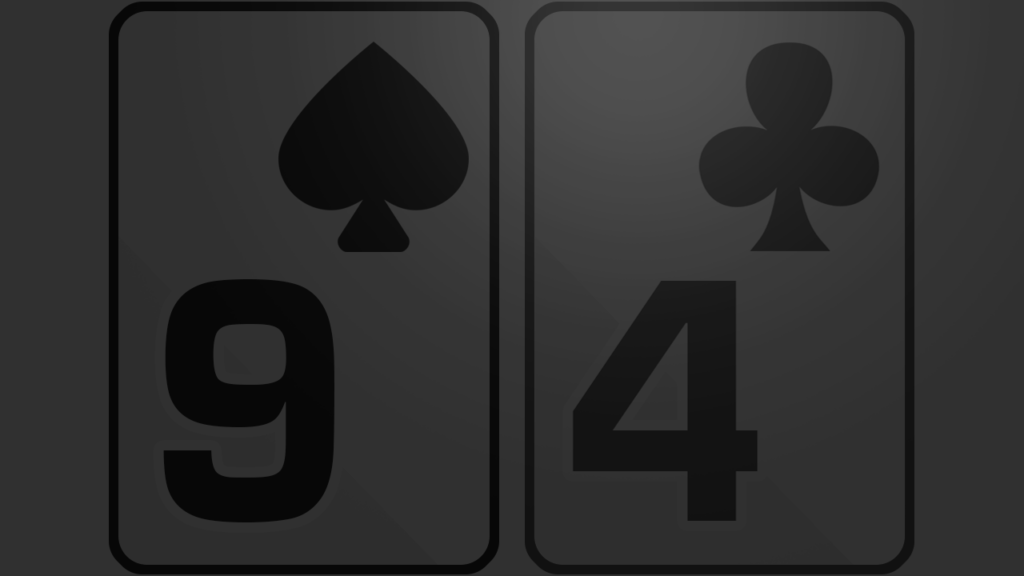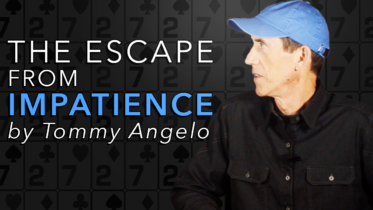Impatience is a trifecta of troubles. It’s a form of anguish. It makes us behave immaturely. And at Texas Hold’em, impatience costs us money when we make inferior plays that we would not otherwise make, but for the impatience.
With those three ugly strikes against it, why are we not dedicating our lives to its good riddance?
One reason is because we don’t even consider the possibility. Another is that the escape takes time, and few have the patience for it.
Tests of Patience: Lines, Card-death, and Long Tanks
Waiting in lines. Waiting in traffic. Waiting in general. It’s normal to feel agitated, right? What if it wasn’t?

We all know what it feels like to be card dead – when you get so many nowhere hands in a row that you think it impossible that an odds-based universe could deal you another 9-4 offsuit. And then it does. Stupid universe. Or maybe the universe just is, and impatience is stupid.
Marvin is such an egregious tanker that the whole table groaned when they called him for the open seat. Your mood tanked too, and Marvin hadn’t even tanked yet. Is he that powerful, or are you that vulnerable?
The Root of Impatience
Lines and tanks and card death are all the same in that whatever agony we feel is self-inflicted, caused by our inability to do nothing. That’s the root of impatience, right there: we can’t sit still and feel at ease. Kinda funny, right? Our main problem is that doing nothing is a problem.
Why I Never Have and Never Will Call the Clock
Imagine a football game where delay-of-game penalties are determined not by the officials but rather by the players. That’s what calling-the-clock is. Players become floormen, whether we want to or not, and our job is to decide precisely when enough is enough.
This is not ideal, obviously, in theory or in practice. It is, however, necessary, because the alternative would be to have no rule or protocol for limiting the length of a tank. So I’m fine with the clock, even though I’ve never called it. The reasons why have changed over the decades, and as it turns out, they chart my escape from impatience.
Reason #1: Stubbornness
I used to think of long tanks as a throw-down, a test of will. Why else would somebody wait a week before folding after I shoved? I just figured they were distraught about losing another pot to me, and they were doing whatever they could to piss me off.
As each second crawled by … I would sit there … hum-de-dum … looking aloof … feeling aflame.
But I wouldn’t dare let my opponent win this battle of wits by calling the clock. That would reveal my bitterness. So I sat firm, inspired by Tom Petty to not back down.
Reason #2: Sacredness
Then came 2003. That’s when I started doing meditationy stuff at the table. A gentler heart allowed an appreciation of sacredness to flower. Appreciation of my space and my rituals, combined with respect for the sacred space of others, especially when they have a live hand. Not just physical space and mental space, but temporal space as well.
As a pro, when I’m at the table, I have all the time in the world, and my partners-in-poker can have as much as they want.
Reason #3: Transience
If I’m a reg in a local room, I’ll help out with resolving small irregularities during the game. On the road, not so much. I leave it to the locals to police the game and assist as needed, like I do at home. If somebody tanks forever, the locals will determine when enough is enough, within their culture, and call the clock. As a transient, I feel it’s not my place.
Reason #4: Transcendence
It’s now 2024 and I can report from the field that after 20 years of merging poker with calm abiding, tank time is now a time of restoration, and it doesn’t matter if I’m in the hand or not. I practice mindful sitting. I practice mindful breathing. I sit and breathe at the oval altar, in communion with my fellow practitioners. The longer the tank, the better I feel. With all that going on, there’s no space for impatience, or clocks.
The Escape from Impatience
To learn new software like poker solvers, we dive in and use it. There’s no other way. Or say, guitar. You can watch a hundred videos about how to play one, but until you hug one, you got nothing. It’s the same with patience. Learning it and doing it are the same thing.

If the pain of impatience comes from our inability to sit still, and if you want more patience in your life, then the sensible play would be to train at the act of sitting still.
As it happens, the Buddhists have this thing called sitting meditation. If you’ve had it to here with unhappiness, you might want to check this out. It’s just you, sitting comfortably, following Buddha’s instructions on what to do next.
Training at stillness when you are at home is like digging a tunnel into your mind that you can use during poker to escape from impatience. And what a relief that is. You’re finally free to just sit there … hum-de-dum … looking aloof … and feeling it too. You have only yourself to thank for these waves of betterment, brought to you by your mind, for your mind.
On the downside, tunnel-digging is a slow process. But don’t worry. You probably have time if you start now.




